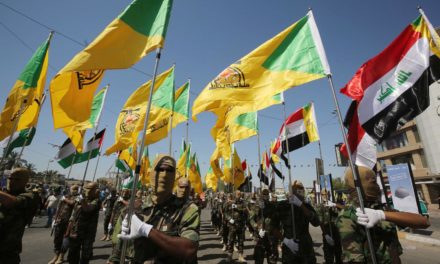“No retreat! Long live Iraq!” were the last words war correspondent Major Alaa Al-Edani yelled out before losing consciousness. Just minutes before, he was warned by his fellow soldiers that the area they were entering hadn’t been cleared of IEDs yet. In keeping with his determined and courageous manner, he replied “I’m an officer, I’ll go wherever you go.”
He was embedded with an Iraqi army unit that was conducting clearing operations in the rural Zaydan village west of Baghdad, a volatile hotbed of insurgency that had proved impossible for American troops to clear and has posed even more problems for Iraqi forces. Da’ish enjoys strong support from locals in Baghdad’s western belt (towards Fallujah), which makes it easier for militants to carry out ambushes and plant IEDs (improvised explosive devices).
The 32-year-old father of 3 is a veteran of the war on Da’ish, covering just about every major battle and offensive the Iraqi army has undertaken in the provinces of Anbar, Salahuddin, Diyala, Kirkuk, Babil and Baghdad. Major Alaa, alongside his fellow battlefield correspondents, played a pivotal role in the ongoing media war between Da’ish and Iraqi forces. His frontline reporting was invaluable and stretches back to the earliest Iraqi operations launched a few months after the fall of Mosul.
It was one of these IEDs that blew up next to Major Alaa. He suffered a long list of injuries including severe burns to his body, dreadful facial disfigurement and the loss of his eyesight. He was transported back to Baghdad for urgent medical care and was soon after flown out by the Ministry of Defence to Iran to receive care that wasn’t available in Iraq.

Bombs and bullets have left tens of thousands of Iraqi troops like Major Alaa languishing in agony without proper medical care for their physical and mental ailments. Iraq is in dire need of more hospitals, clinics, doctors, nurses and the money to produce and fund them. But such don’t deter men like the Major because after decades of oppression under a ruthless dictatorship, a vicious occupation and at the mercy of terrorism, too much blood has been shed for Iraqis to give up now.
Major Alaa epitomizes a whole generation of gifted and ambitious Iraqi men who have sacrificed so much in the hope that Iraq’s future generations will see a day where their country is a blossoming hub of security, freedom and prosperity. A whole generation that has known nothing but pain and suffering. A generation that merely exists but does not live. However, Major Alaa also embodies the steadfastness and resolution of this generation, one that doesn’t bow to terror and tyranny and gets knocked down but not out.
“The man didn’t know fear. He was present at some of the most violent battles we faced during the liberation of Tikrit and not once did he show any signs of anxiety or fear for his life,” said a Hashd Al-Sha’abi (aka Popular Mobilisation Forces) fighter who met Major Alaa during the offensive to recapture Tikrit in March 2015. “Every time he saw our unit, he lifted our morale with words of encouragement. You could see his love for Iraq in his eyes and you could hear it in his voice.”
Colleagues of Major Alaa at the Ministry of Defence had nothing but praise for the man they repeatedly described as a warrior. “Major Alaa is Major Iraq. He lives and breathes Iraqi nationalism. His love for this country led him to enlist in the army and move up the ranks to become an officer,” said a media official in Ministry of Defence who regularly worked alongside the Major prior to his injury. “As a war correspondent he showed his bravery by going to the front lines in the war against Daesh and showing Iraqis what their brave young men are up against in their battle against evil. I know I speak on behalf of his thousands of followers when I say we are praying for his speedy recovery.”
And the Major, who was a Captain prior to his injury, wasn’t just a hero to his co-workers. In a country desperate for good news, the clean-cut, well-spoken soldier donning his beret and wielding his microphone had become a household name. When news broke out of the Major’s injury, thousands of Iraqis took to social media platforms like Facebook and Twitter to express their sadness and to wish him a speedy recovery.
Victory against the demonic forces of terror will be built upon the shoulders of men who left everything they held dear behind to make the ultimate sacrifices so that humanity triumphs over evil, peace over war. Major Alaa didn’t sacrifice his eyesight and much more for Iraq, but for the whole world. We must remember that Iraq’s warriors aren’t just fighting for their land but on behalf of a world gripped by the tentacles of terror. And for that, we must all be grateful.
Major Alaa always made sure to end his reports with messages of unity, hope and resistance in the face of Da’ish. His formidable resolve will surely help him get back to his feet and back in the fight, whether it’s back in front of the camera or behind the scenes at the Ministry of Defence because only death can snatch determination away from such men.
Speaking in an interview on Iraqi television, the Major displayed his tenacious bravery in two short sentences:
“If my eyesight returns, I would return (to the battlefield). Until my martyrdom.”

Haidar Sumeri
Haidar Sumeri is a Middle East observer, mainly focusing on Iraq’s war on terrorism.










